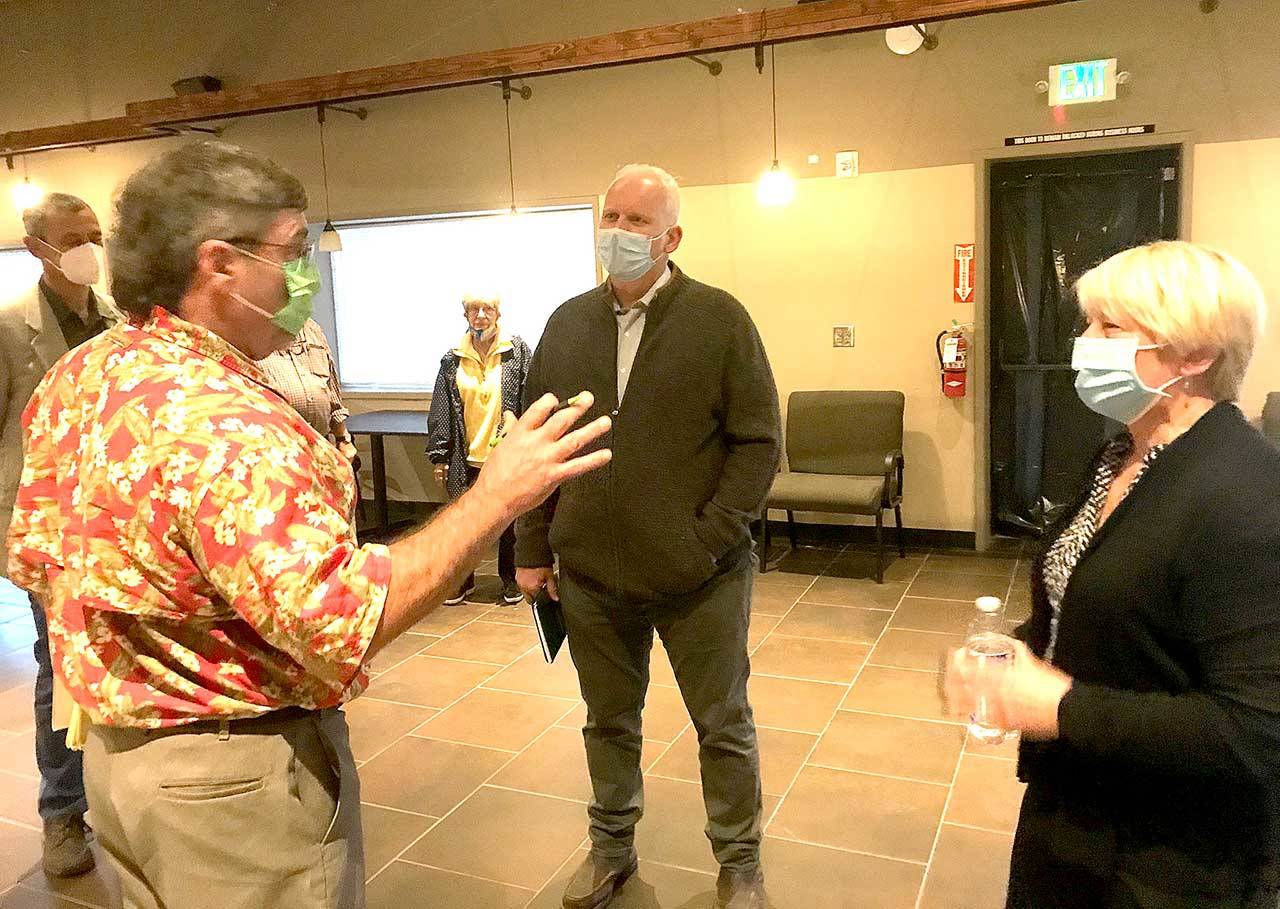PORT ANGELES — With a month to go before voters start receiving ballots, two 24th Legislative District state Senate candidates discussed taxes, the financial impact of the COVID-19 pandemic and auditing the state Department of Natural Resources in a forum Tuesday.
The general election is Nov. 3.
Subtle differences arose between incumbent Democrat Kevin Van De Wege of Sequim and Republican challenger Connie Beauvais of Joyce during the hour-long program sponsored by the Port Angeles Business Association.
Both left the door open to raising taxes in the face of an estimated $9 billion 2020-23 budget deficit brought about by declining revenues due to the pandemic.
“I signed a pledge, pledging that I would not raise net taxes, and I say net because you can do away with some taxes and start some other taxes in order to modernize yourself and pay for, you know, programs that are appropriate for this time,” said Beauvais, a Port of Port Angeles commissioner.
Beauvais, the manager-operator of the Crescent Water Association, said she could not say what programs she would cut to balance the four-year spending plan.
“I haven’t looked at the whole budget,” she said.
“We need to decide which programs are most important.”
Beauvais said mental health programs are a growing priority because of the pandemic.
“We need to roll back to the initial budget and do cutting from there,” she said, echoing other Republican legislative candidates.
Van De Wege, a former House member ending his first four-year term in the Senate, said the state is in a better position to weather the deficit than it was during the 2008-09 Great Recession.
“This is not as bad as the Great Recession by any means,” said Van De Wege, a paramedic-lieutenant with Clallam County Fire District 3.
He said that, back then, the state did not have a rainy-day fund and the federal government was not stepping forward with financial assistance.
Van De Wege said state agencies are not being used to the extent they were during the Great Recession, adding that cutting the cost of government is another way to make up the deficit.
“There are potentially anywhere from $100 million to a billion dollars we can do by closing down tax loopholes,” he added.
“And then, if all that happens, and we are not there, and I think actually we will be there, we will get to a balanced budget by that time if the economy continues to recover.
“If we’re not, though, after doing all that cutting, then we’ll get additional taxes.”
Spending cuts will come from state agencies as requested by Gov. Jay Inslee, who is seeking 15 percent reductions, but voter-elected agency directors such as state Commissioner of Public Lands Hilary Franz are not included in the directive, Van De Wege said.
Beauvais cited the “huge” arrearage, or the difference between the sustainable harvest level and the amount harvested, that DNR is “sitting on” as a way to generate revenue.
Beauvais said rather than increase DNR management fees to 35 percent of timber cuts, as she said Franz has proposed, the harvest of arrearage timber should be increased to generate the revenue, which would boost the economy.
“There should not be an arrearage,” she said.
Beauvais said that “absolutely” a performance audit of the DNR should be conducted to review the agency’s timber management and revenue-generating practices.
“I am not a person who wants to see the hills raped when timber is harvested,” she said.
“Rather, when we do forestry, proper forestry, of course you do a commercial thinning, and when you do it right, the trees that are left serve those two purposes. The trees that are left will grow faster and be able to be marketed sooner.”
Timber assets must be reviewed so they are sustainable for decades, Beauvais added.
“It’s important at least for us to know those lands are being managed properly,” she said.
Van De Wege said he has made the same audit proposal but said DNR is “very fearful” of the legislation, agreeing the agency’s top responsibility is harvesting timber that ends up as revenue for tax districts.
“We want to pass legislation that has an outside group, a monitoring group, to make sure that is happening,” he said.
“This legislation would be geared toward auditing the timber harvest of DNR, which is different than a broad oversight. Right now we do audit the funding.”
Van De Wege said the district’s most pressing need is jobs.
“I’ve tried hard and been successful keeping mills open,” he said, adding he has eased the permitting process for mills to ensure they can stay open.
He said he worked to pass the Workforce Education Investment Act, which provides free tuition to members of families making under $50,000 a year.
Beauvais said one of the biggest issues facing the district is helping the Black Ball Ferry Line’s efforts to stay viable while it shuts down service due to COVID-19-related international travel restrictions.
When looking at “the big picture,” she agreed the top issue for legislative district residents is jobs.
Tuesday’s forum was the second debate between Beauvais and Van De Wege, he said.
“In the first debate, my opponent said it’s not government’s job to create jobs, and I was surprised by that, especially because she’s a port commissioner and that’s just, like, the reason we have a port commission is to create jobs,” Van De Wege said.
Beauvais chastised him for his description of the port’s role.
“No, what the port does is, we create the infrastructure to make those businesses possible,” she said.
“We don’t hire employees. We make the infrastructure available, and that’s what the state should be doing for us, too.”
Asked if he had anything to add, Van De Wege said, “Nothing at all.”
________
Senior Staff Writer Paul Gottlieb can be reached at 360-452-2345, ext. 55650, or at pgottlieb@peninsuladailynews.com.
